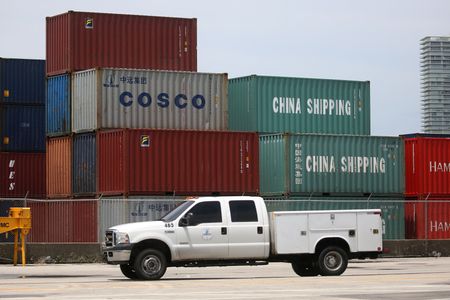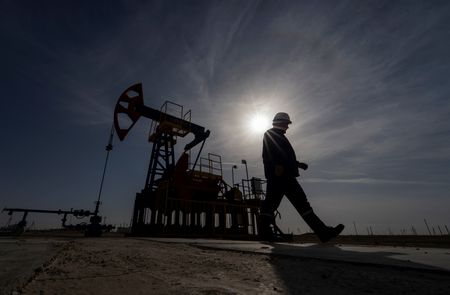By Clare Jim and Brenda Goh
HONG KONG/SHANGHAI (Reuters) -The provincial government leading China Evergrande Group’s restructuring wants to separate the company’s offshore assets and sell them to pay off foreign debt, a media report said on Friday, in a boost to foreign lenders’ hopes of recouping funds.
Financial intelligence provider REDD said on Friday the provincial government in Guangdong, where Evergrande is based, aimed to release a framework debt restructuring plan by March that could also wipe out the 60% stake of the group’s chairman.
Citing two sources briefed on the matter, REDD said the provincial government was proposing that state-led investors should buy Evergrande <3333,HK> assets and that proceeds from the sale of foreign assets should be used to pay offshore debt.
While investors have been expecting state-led organisations to help smooth the restructuring, some have been concerned that Beijing would use proceeds from any asset sales to prioritise paying off onshore debt.
The provincial government has finalised the framework document and submitted it to China’s cabinet for discussions late this week, REDD said, adding a detailed restructuring proposal would be released by October.
The provincial government, cabinet and Evergrande did not respond to requests for comment outside regular business hours.
Evergrande is the world’s most-indebted property company with more than $300 billion in liabilities, including nearly $20 billion of international bonds all deemed to be in default after a run of missed payments late last year.
Evergrande’s April 2023 U.S. dollar bond jumped to 17.762 cents on the dollar after the REDD report, data by Duration Finance showed, up from 12.227 overnight. Its shares closed down 0.6%, before the report was published.
The REDD report also said Evergrande Chairman Hui Ka Yan’s 59.78% stake in the company could be wiped out after completion of the restructuring because the developer is “significantly insolvent.”
Earlier on Friday, the developer said in a filing it was hiring more financial and legal advisers – China International Capital Corp Ltd, BOCI Asia Ltd and Zhong Lun Law Firm – to follow up with demands from creditors.
That came a day after an offshore creditor group, represented by law firm Kirkland & Ellis and investment bank Moelis, said it was ready to take “enforcement actions” to defend members’ rights after what it said was Evergrande’s lack of engagement.
Evergrande has asked offshore bondholders to disclose holdings, according to a letter seen by Reuters on Friday. The developer is seeking replies by mid-next week to identify investors for communications, to aid debt restructuring.
SIGNS OF IMPROVEMENT
Stocks and bonds of Chinese property developers have gained this week on hopes a slew of recent government measures would help the sector’s liquidity and reverse a slump in construction, a key economic growth driver.
In another sign of improving sentiment, Country Garden, China’s biggest property developer by sales, said it would issue HK$3.9 billion of convertible bonds to refinance debt that will become due within one year.
The bonds, due July 2026 and which could be sold back to the company in January 2024, carry 4.95% interest and have an initial conversion price of HK$8.10 per share. At full conversion, the shares would represent 2% of enlarged capital.
The new issue followed a report that the developer failed to attract demand for a potential $300 million convertible bond last Wednesday. IFR reported Country Garden tested the waters for a three-year deal which would carry a yield-to-maturity of 4.75% and a conversion premium of 25%.
Shares of Country Garden dropped nearly 3% to HK$6.76, while its January 2023 international bond rose to 97.825 from 92.787 overnight.
BUYING TIME
Evergrande’s financial crisis has roiled other Chinese property developers over the past half year and exacerbated a funding squeeze in the sector.
Rating agency Fitch downgraded China Aoyuan Group to “restricted default” on Friday after the firm said it planned not to make principal and interest payments for all its offshore debt.
Beijing stepped up efforts to prop up a slowing economy with a raft of key rate cuts this week.
Policymakers are also drafting nationwide rules to make it easier for developers to access funds from sales still held in escrow accounts, which would improve their short-term liquidity and buy time to repay debt, Reuters reported on Wednesday.
($1 = 7.7886 Hong Kong dollars)
(Editing by Kim Coghill and Mark Potter)












